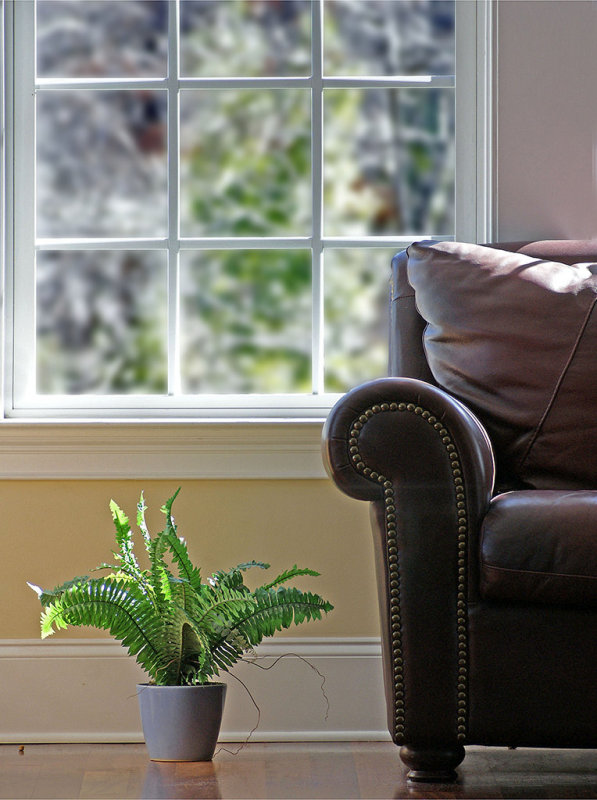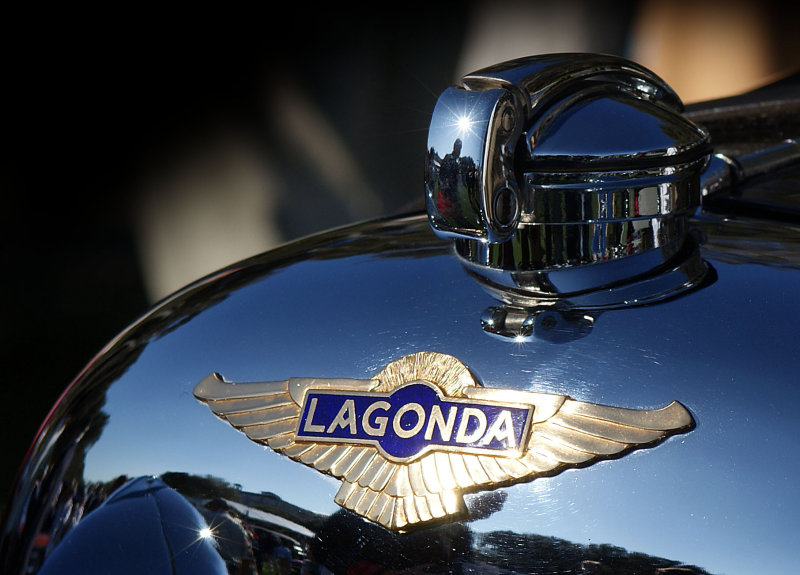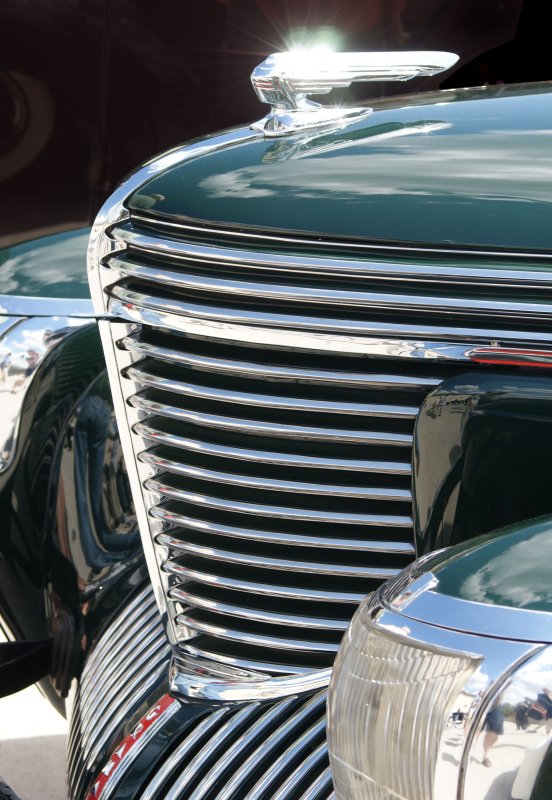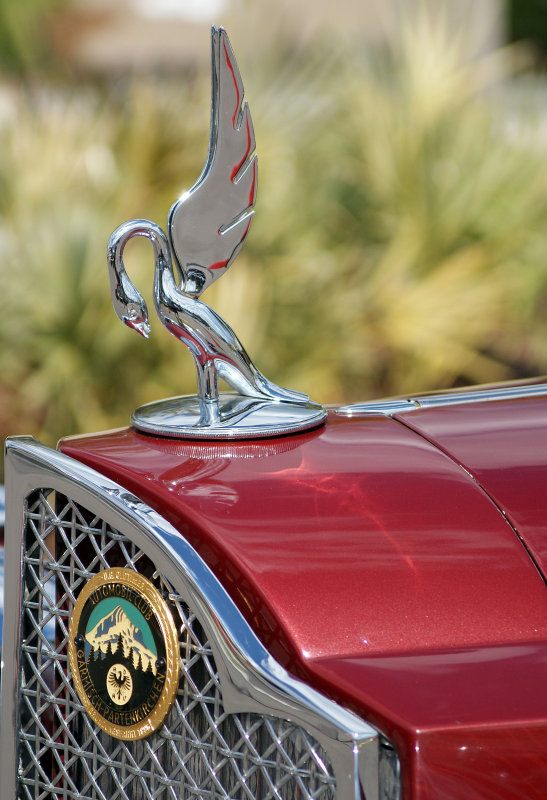| View previous topic :: View next topic |
| Author |
Message |
slick204
Joined: 23 Feb 2010
Posts: 17
Location: Iowa, USA
Expire: 2012-04-22
|
 Posted: Tue Feb 23, 2010 2:12 am Post subject: Posted: Tue Feb 23, 2010 2:12 am Post subject: |
 |
|
slick204 wrote:
Woodrim,
I recently got a Vivitar Series 1 200/3 in a Minolta mount. My intent is to change it to a Pentax K mount. After removing the four screws I can only pull the mount a short distance off the body (~1/8"). Is there some trick to this? Every other lens I've worked on is easily removed.
I figured since you have the Viv 200 and worked on a Minolta mount Viv 90 you might know.
Thanks! |
|
| Back to top |
|
 |
woodrim


Joined: 14 Jan 2010
Posts: 4060
Location: Charleston
|
 Posted: Tue Feb 23, 2010 2:35 am Post subject: Posted: Tue Feb 23, 2010 2:35 am Post subject: |
 |
|
woodrim wrote:
slick: I'll take this offline with a PM. Too much detailed dribble to bother everyone.
_________________
Regards,
Woodrim |
|
| Back to top |
|
 |
woodrim


Joined: 14 Jan 2010
Posts: 4060
Location: Charleston
|
 Posted: Fri Mar 05, 2010 3:04 am Post subject: Posted: Fri Mar 05, 2010 3:04 am Post subject: |
 |
|
woodrim wrote:
Having now learned how to use this lens, I'm very satisfied that it is a very sharp lens. I've learned how to deal with the purple fringing, which was my biggest complaint, and now it's a minor issue. The biggest thing was getting used to the focus and getting it right. The following images can be found here for original image size:
http://www.pbase.com/mdlempert/image/122483908/original
http://www.pbase.com/mdlempert/image/122335799/original


_________________
Regards,
Woodrim |
|
| Back to top |
|
 |
slick204
Joined: 23 Feb 2010
Posts: 17
Location: Iowa, USA
Expire: 2012-04-22
|
 Posted: Fri Mar 05, 2010 3:59 am Post subject: Posted: Fri Mar 05, 2010 3:59 am Post subject: |
 |
|
slick204 wrote:
It looks like you're getting the hang of that lens! They're both very nice.
The final version of the window looks great. You say on PBase that it's HDR. Is that mostly for the window? |
|
| Back to top |
|
 |
Russ

Joined: 26 Feb 2007
Posts: 432
|
 Posted: Fri Mar 05, 2010 4:02 am Post subject: Posted: Fri Mar 05, 2010 4:02 am Post subject: |
 |
|
Russ wrote:
Looks good. Now you'll want the AF version. 
_________________
'A photograph that mirrors reality, cannot compare to one that reflects the spirit"
Russ |
|
| Back to top |
|
 |
woodrim


Joined: 14 Jan 2010
Posts: 4060
Location: Charleston
|
 Posted: Fri Mar 05, 2010 4:26 am Post subject: Posted: Fri Mar 05, 2010 4:26 am Post subject: |
 |
|
woodrim wrote:
slick: Yes, the window. I must admit I don't know what the official definition of HDR is, if there is one. In my mind it doesn't need to be every aspect of the photo. I have seen HDR where everything was very even, and that didn't look good to me. I've corrected for the outdoors as seen through the window to look bright as one might expect when standing in that room with their eyes more adjusted to indoors, but not blown out as originally exposed. Likewise, I've adjusted the exposure indoors to look like what it might appear if you were there. Maybe not correct HDR by definition, but by my definition.
Russ: No thanks on the AF version. It's an interesting testament to the developing technology, but weight and speed are affected by the large AF mechanism. Besides, I've discovered that I like manual focus and manual diaphragm as it reminds me more of my early film days. In those times one had to think and work for the image. I enjoy the challenge.
_________________
Regards,
Woodrim |
|
| Back to top |
|
 |
cooltouch


Joined: 15 Jan 2009
Posts: 9096
Location: Houston, Texas
|
 Posted: Fri Mar 05, 2010 5:49 am Post subject: Posted: Fri Mar 05, 2010 5:49 am Post subject: |
 |
|
cooltouch wrote:
Well, I dunno if this would rank as an "official definition" or not, but here's the link to what Wikipedia says HDR is:
http://en.wikipedia.org/wiki/High_dynamic_range_imaging
Me, I prefer doing HDRs such that they bring out detail that is otherwise lost in a "normal" photo. While I can appreciate some of the rather spectacular HDR techniques that are often demonstrated, I find that I prefer results that bring out what's hidden over the surreal, which has all-too-often become the norm when folks think of HDR.
Boomer, I appreciate very much your sharing your knowledge regarding the history of the Vivitar 90mm macro. Sounds like you know whereof you speak. I guess I'm gonna have to add one of these, or the Tokina equivalent, to my collection one of these days. Heh. Who knows? Perhaps I'll find one in a local shop like I found the subject Vivitar 105 . . .
_________________
Michael
My Gear List: http://michaelmcbroom.com/photo/gear.html
My Gallery: http://michaelmcbroom.com/gallery3/index.php/
My Flickr Page: https://www.flickr.com/photos/11308754@N08/albums
My Music: https://soundcloud.com/michaelmcbroom/albums
My Blog: http://michaelmcbroom.com/blogistan/ |
|
| Back to top |
|
 |
hinnerker


Joined: 17 Aug 2009
Posts: 929
Location: Germany near Kiel
Expire: 2015-08-09
|
 Posted: Wed Mar 17, 2010 10:54 pm Post subject: Vivitar Series 1 VMC 2.8/35-85mm M42 Posted: Wed Mar 17, 2010 10:54 pm Post subject: Vivitar Series 1 VMC 2.8/35-85mm M42 |
 |
|
hinnerker wrote:
Ok, here is another Series 1.. out of my collection.

Dont know if you have already introduced this in the discussion.
Its an impressiv lens with f2.8!!!! /35-85mm in M42 mount.
The VMC works not parfokal. That means you have to refocus everytime you change the focal length.
But the results are lovely.

and the crop shows the sharpness...

Here are some further informations...
http://www.mail-archive.com/pdml@pdml.net/msg78725.html
Cheers
Henry
_________________
some light-painting lens stuff.. 
... and an EOS 5D MKII
www.digicamclub.de |
|
| Back to top |
|
 |
woodrim


Joined: 14 Jan 2010
Posts: 4060
Location: Charleston
|
 Posted: Thu Mar 18, 2010 12:53 am Post subject: Posted: Thu Mar 18, 2010 12:53 am Post subject: |
 |
|
woodrim wrote:
That picture was shot wide open or close to it? I see the purple fringe and ghosting similar to my Series 1 200mm. Was that a 100% crop?
_________________
Regards,
Woodrim |
|
| Back to top |
|
 |
hinnerker


Joined: 17 Aug 2009
Posts: 929
Location: Germany near Kiel
Expire: 2015-08-09
|
 Posted: Thu Mar 18, 2010 5:52 am Post subject: Posted: Thu Mar 18, 2010 5:52 am Post subject: |
 |
|
hinnerker wrote:
| woodrim wrote: |
| That picture was shot wide open or close to it? I see the purple fringe and ghosting similar to my Series 1 200mm. Was that a 100% crop? |
Sorry, yes and yes.. the shown shot was taken wide open and the detail a crop from the same first picture. Behind the "Money Buddha" is a mirror... which doubles the scene... 
For showing the complete situation...

Cheers
Henry
_________________
some light-painting lens stuff.. 
... and an EOS 5D MKII
www.digicamclub.de
Last edited by hinnerker on Thu Mar 18, 2010 6:04 am; edited 3 times in total |
|
| Back to top |
|
 |
Russ

Joined: 26 Feb 2007
Posts: 432
|
 Posted: Thu Mar 18, 2010 6:00 am Post subject: Posted: Thu Mar 18, 2010 6:00 am Post subject: |
 |
|
Russ wrote:
I suppose I should take my Viv S-1 35-85 out for a serious lens test...
_________________
'A photograph that mirrors reality, cannot compare to one that reflects the spirit"
Russ |
|
| Back to top |
|
 |
hinnerker


Joined: 17 Aug 2009
Posts: 929
Location: Germany near Kiel
Expire: 2015-08-09
|
 Posted: Thu Mar 18, 2010 6:29 am Post subject: Posted: Thu Mar 18, 2010 6:29 am Post subject: |
 |
|
hinnerker wrote:
| Russ wrote: |
| I suppose I should take my Viv S-1 35-85 out for a serious lens test... |
Thats a good idea ... 
The Viv S1 has some vignetting on edges, like most of old variable focus lenses on the 5D MKII.. and shows some barrel distortion on the short end. But on a Crop cam, you mostly cant see that. And the focal length - range from 56m to 135mm FF equivalent is lovely.

Here is another shot, wide open on 5D MKII and also a crop out of it.

The crop..

The variable focus is a bit hard to handle, because of the non parfocal working, but after a while.. i like this lens... i have got far better lenses, like Angenieux 2.5-3.3/35-70mm but this is a good and cheap one with f2.8...
Cheers
Henry
_________________
some light-painting lens stuff.. 
... and an EOS 5D MKII
www.digicamclub.de |
|
| Back to top |
|
 |
hinnerker


Joined: 17 Aug 2009
Posts: 929
Location: Germany near Kiel
Expire: 2015-08-09
|
 Posted: Thu Mar 18, 2010 6:36 am Post subject: Posted: Thu Mar 18, 2010 6:36 am Post subject: |
 |
|
hinnerker wrote:
And a last one, showing the Viv S1 35-85mm/2.8 itself..

Cheers
Henry
_________________
some light-painting lens stuff.. 
... and an EOS 5D MKII
www.digicamclub.de |
|
| Back to top |
|
 |
cooltouch


Joined: 15 Jan 2009
Posts: 9096
Location: Houston, Texas
|
 Posted: Thu Mar 18, 2010 7:01 am Post subject: Posted: Thu Mar 18, 2010 7:01 am Post subject: |
 |
|
cooltouch wrote:
The S1 35-85/2.8 is a great lens, and worth being acquired by any serious Vivitar collector. I owned one years ago -- I was a camera dealer and it was inventory -- and have been intrigued by it ever since. It is on my "buy" list again.
I'm curious how it compares optically with the S1 24-48/3.8. Seems to me that the pair would be ideal for most any photographic situation up to short tele requirements. Full frame, of course.
_________________
Michael
My Gear List: http://michaelmcbroom.com/photo/gear.html
My Gallery: http://michaelmcbroom.com/gallery3/index.php/
My Flickr Page: https://www.flickr.com/photos/11308754@N08/albums
My Music: https://soundcloud.com/michaelmcbroom/albums
My Blog: http://michaelmcbroom.com/blogistan/ |
|
| Back to top |
|
 |
walter g


Joined: 20 Feb 2010
Posts: 2463
Location: NC, USA
|
 Posted: Thu Mar 18, 2010 7:19 am Post subject: Posted: Thu Mar 18, 2010 7:19 am Post subject: |
 |
|
walter g wrote:
I know about the Kiron made Vivitars, and the ones they made for Lester Dine.But I've not heard about ones made for Rikenon.
Please check out this one on Ebay.
http://cgi.ebay.com/Rikenon-P-Kiron-105mm-f-2-8-Macro-Lens-Pentax-K-Mount_W0QQitemZ330413787289QQcmdZViewItemQQptZCamera_Lenses?hash=item4cee324899
_________________
Main cameras
Panasonic G5,Nikon J1,Pentax Q10,Sony Nex 6
Minolta MC W SI 2.5/28, MD 2.8/28, MC W SG 3.5/28, MC Celtic 3.5/28, MC W HG 2.8/35, MD Celtic 2.8/35, QE 4/35, Rokkor X 2/45, MC Rokkor X PG 1.4/50, MC Rokkor X PG 1.7/50, MD Rokkor X 1.7/50, MD 2/50, MC Rokkor PF 1.7/55, MC Rokkor PF 1.9/55, Auto Tele Rokkor PG 2.8/135, MC Tele Rokkor QD 3.5/135, TC 4/135, MC Celtic 4/200, MC Tele Rokkor PE 4.5/200
MD 28-70 f3.5-4.8, MD Macro 35-70 f3.5, Md 70-210 f4, MD Rokkor X 75-200 f4.5, MD 100-200 f5.6
Nikon Nikkor 4/20, O Auto 2/35, S Auto 1.4/50..... Miranda Auto 2.8/28, Auto 2.8/35, Auto 1.4/50, Auto EC 1.4/50, Auto 1.8/50, Auto EC 1.8/50,Auto 1.9/50, Auto 3.5/135
Various Soligor,Sun,Fujita,Komura,Spitatone, etc. Lenses
|
|
| Back to top |
|
 |
justtorchit


Joined: 12 Oct 2009
Posts: 269
Location: St. Louis, MO
|
 Posted: Thu Mar 18, 2010 8:02 am Post subject: Posted: Thu Mar 18, 2010 8:02 am Post subject: |
 |
|
justtorchit wrote:
It looks very similar to the earlier Vivitar Kiron-made lens, their 100mm f/2.8. I have actually been interested in testing one of these against the kiron/dine/viv series 1. I would believe they will be very similar!
_________________
David
www.davidkovaluk.com - personal website
www.instagram.com/davidkovaluk
http://makingnottaking.blogspot.com/ - photoblog |
|
| Back to top |
|
 |
woodrim


Joined: 14 Jan 2010
Posts: 4060
Location: Charleston
|
 Posted: Thu Mar 18, 2010 1:40 pm Post subject: Posted: Thu Mar 18, 2010 1:40 pm Post subject: |
 |
|
woodrim wrote:
I'm sure that was a great lens in its day. I have a sentimental thing for the Series 1 lenses, but I'm sticking with the primes. I try not to collect lenses, and in doing so try not to duplicate. I think my wife keeps a count of the lenses, so I have to hide one when another arrives (she can't tell the difference between lenses) 
I have a Minolta 35-105mm from the '80s that is superb. I know this is a MF forum, so the lens doesn't qualify, but it is my go-to lens for that range. In fact, I chose it as my one and only lens for an event last weekend where I didn't want to be carrying anything extra. I gave it a good workout, taking close to 400 pictures at the Amelia Island Concours. I was amazed at how well the lens did. Not a bit of flare or CA despite very challenging conditions with a bright sun and lots of reflective chrome. The sharpness is also exceptional. If I can't get away with a single prime, I'll use a lens like this one.




_________________
Regards,
Woodrim |
|
| Back to top |
|
 |
Russ

Joined: 26 Feb 2007
Posts: 432
|
 Posted: Thu Mar 18, 2010 3:03 pm Post subject: Posted: Thu Mar 18, 2010 3:03 pm Post subject: |
 |
|
Russ wrote:
| cooltouch wrote: |
The S1 35-85/2.8 is a great lens, and worth being acquired by any serious Vivitar collector. I owned one years ago -- I was a camera dealer and it was inventory -- and have been intrigued by it ever since. It is on my "buy" list again.
I'm curious how it compares optically with the S1 24-48/3.8. Seems to me that the pair would be ideal for most any photographic situation up to short tele requirements. Full frame, of course. |
Michael
I really like my Viv S-1 24-48. The only snaps I have scanned from it ar B/W IR snaps. A very crappy film for testing, but great for images,

_________________
'A photograph that mirrors reality, cannot compare to one that reflects the spirit"
Russ |
|
| Back to top |
|
 |
justtorchit


Joined: 12 Oct 2009
Posts: 269
Location: St. Louis, MO
|
 Posted: Thu Mar 18, 2010 4:22 pm Post subject: Posted: Thu Mar 18, 2010 4:22 pm Post subject: |
 |
|
justtorchit wrote:
woodrim-
love those detail shots! looks like it was a gorgeous day too!
_________________
David
www.davidkovaluk.com - personal website
www.instagram.com/davidkovaluk
http://makingnottaking.blogspot.com/ - photoblog |
|
| Back to top |
|
 |
westromat
Joined: 10 Mar 2010
Posts: 9
|
 Posted: Thu Mar 18, 2010 6:03 pm Post subject: Posted: Thu Mar 18, 2010 6:03 pm Post subject: |
 |
|
westromat wrote:
| woodrim wrote: |
....
I gave it a good workout, taking close to 400 pictures at the Amelia Island Concours. I was amazed at how well the lens did. Not a bit of flare or CA despite very challenging conditions with a bright sun and lots of reflective chrome. The sharpness is also exceptional. If I can't get away with a single prime, I'll use a lens like this one.
 |
Funny to see an old ADAC plate (germanys AAA) on a car a long way abroad   ... which car was it? ... which car was it?
the lens is fine.
westromat
_________________
M42: Soligor 35/2 - ISCO Westromat 35/2.8 - Pentacon 50/1.8 - Eximar 135/2.8 - Hanimex 200/3.5 - Vivitar 70-210/3.5 |
|
| Back to top |
|
 |
woodrim


Joined: 14 Jan 2010
Posts: 4060
Location: Charleston
|
 Posted: Thu Mar 18, 2010 10:53 pm Post subject: Posted: Thu Mar 18, 2010 10:53 pm Post subject: |
 |
|
woodrim wrote:
Thanks, justtorchit, it was indeed a beautiful day.
westromat: The car was a Packard if my memory serves. It wasn't unusual to find cars from overseas. This is a premier event second only to Pebble Beach. More million dollar cars than you can shake a stick at. I think the (one and only) Jaguar XJ13 is valued at $20 million or more. Keep checking the gallery; I'm still adding images.
_________________
Regards,
Woodrim |
|
| Back to top |
|
 |
abaris
Joined: 29 Oct 2010
Posts: 3
Location: ny
|
 Posted: Sun Mar 04, 2012 2:48 am Post subject: Posted: Sun Mar 04, 2012 2:48 am Post subject: |
 |
|
abaris wrote:
| Boomer Depp wrote: |
Woodrim...From my understanding both these Tokina built lenses are the same optical formula.Over at the Kiron Club one of the members did a comparison of about five or six macro lenses.The Tokina was better then the other lens,but he didn't have a Vivitar S1 90/2.5 or the Kiron 105/2.8 in the test group....he did have a Vivitar Series 1 100/2.8 (Kiron built)in the test group.
I've also read where the Tokina is a bit smaller then the Vivitar,with not as large a mount as the Vivitar.I also read at Photodo that the Tokina and Vivitar were tied at third from the top,for the highest resolution of all lens tested at Photodo.
BTW...looks like you were busy doing some lens testing with the 200/3.Was one of those pics a crop,or was that taken with your S1 90/2.5....
Also....got my S1 90/25 and a few other lenses back from my daughter today...I'll take time this week to compare it to the Kiron and Vivitar 135 close focus...but it will be inside test,with equal parallel shooting.I suspect the Vivitar S1 and the Kiron will shoot similar and probably a bit better then the Vivitar 135 close focus.
Below is a review of the Tokina AT-X 90/2.5 macro and touches on it's relation to Vivitar.
courtesy of dpreview-
http://forums.dpreview.com/forums/readflat.asp?forum=1034&message=13056277&changemode=1
Having come late to this excellent forum, and reading Todd's superb review of the Tokina 90mm f2.5, I noted that he would like to hear from someone who has experience with a Vivitar Series 1 90mm f2.5.
I bought mine new in the 1970s and have used it ever since as perhaps the finest lens in my stable of 20+ Nikkors and a myriad of 3rd-party Nikon-mount AI and subsequent lenses, AF included.
Some of the posts mention the origin of early Series 1 lenses, but suggest it's something of a mystery. The development of this particular legendary lens was initiated by Vivitar, a U.S. importer and distributor, but designed by Perkin Elmer, a firm that provided many early NASA optics. Actual manufacture was carried out by a number of different optical companies, including Perkin Elmer, Kiron,Tokina and several others, some well known, some not. All had to measure up to exact specifications and, so far as is known, all were of equal quality. My lens, determined by a coded serial number, was made by Tokina in 1977.
Therein lies a possible explanation of the Tokina 90mm's origin. The Vivitar Series 1 edition ceased production in 1981, and I believe Tokina did not issue theirs until 1984. While in Todd's review he found that Tokina claimed no connection with Vivitar, their identical optical formula and quality production must surely have been a matter of something more than coincidental osmosis.
One review of the early Series 1 lenses mentions a test I also remember at the time it was published in the 1970s: that the Vivitar Series 1 90mm f2.5 "shared the honor with the illustrious Leitz Dual Range Summicron of having the highest resolution of any lenses tested by (Herbert Keppler of) Modern Photography." Another report at the time stated it had the highest resolution of any lens ever tested! No wonder Tokina wanted to get in on the action after Vivitar ceased its first Series 1 line, and they were in a perfect position to do so, having made the Vivtar lens to Perkins Elmer's exact specifications.
The quality of glass, metallurgy, and machining in the Series 1 90mm f2.5 is everything that various postings have said about the Tokina 90mm. I have a number of great lenses, but not one of them is superior in any respect to the Series 1. (I also have the famed Vivitar Series 1 90-180mm f4.5 macro zoom, originally designed for medical purposes and just as impressive as the 90mm). My 90mm is now approaching 30 years old, has traveled around the world and operated under all kinds of challenging field conditions while I worked on various National Geographic projects. But it still looks and operates like a new lens (obviously I cherish and protect it) and is just as useful with a DSLR as it was with the big film SLRs, now mostly retired to a lab closet.
So I'm sure the Tokina ATX is its equivalent because I strongly suspect there is a clear relationship, whether Tokina officials today admit or remember, or not.
I wonder how many of these lenses are still in use? I've seen them on eBay for modest sums---I guess people either (a) don't realize what miraculous lenses they are, or (b) don't want a non-AF, non-metering, heavy lens with an additional optical converter to achieve 1:1. Too bad.
One last item: Because the 90mm f2.5 is in fact heavy and large, precious and difficult to replace even back in the 1970s, for rugged, hazardous field work and as a "disposable lens" I shortly thereafter bought a Vivitar 90mm f2.8 with a single mount that focuses 1:1. I've heard its optical formula is just about the same as the f2.5, but it was less expensive because the mount was not so heavily made. Despite that, it has served extremely well and is in as good shape today as when I got it. But when it comes to the most important work under reasonable conditions, the f2.5 is the one to use!
Excuse the length of this post, but it's not often that I have a chance to praise a 30-year-old lens that has been so important to me over the years. |
FYI, to all, the 90mm F2.5 was covered by US Patent 3942875 and the 200 and 135 are covered by US Patent 392876 both of which are now expired. The Designer/Inventor is Ellis I. Betensky and the Assignee is Ponder & Best, Inc. the parent company of Vivitar at the time. I believe also, but have not been able to prove so, the 100mm F2.5 macro may also be covered by one of these patents. The formulas are given in the patents for those who want them.
What you will find is the 90 mm is an outstanding lens design, all around. I have also tested this lens myself and it is unusually sharp and I have two of them (one happens to be slightly sharper than the other). The 100mm tests not quite as sharp at F2.5 but quickly catches up at F/4.0. Unlike the 200, the 135 has almost no lateral color, even small for DSLRs (less than a pixel), however, it like the 200 have a high amount of Longitudinal Color and a significant amount of Spherical Aberration at the largest aperture settings. I also have these lens and have tested them, the 135 being sharper than the 200 wide open. I also have the 35-85mm Series 1 as well as 28-90mm Series 1 and several of the 70-210mm series 1s. They also suffer from spherical, longitudinal color as well as a significant amount of lateral color and astigmatism when compared to the 90mm F/2.5.
To summarize my Series 1 stable with my subjective opinions:
28-90mm zoom (Nikon mount) (yuk wide open, but nice stopped down)
35-85mm zoom (Nikon mount) (barely acceptable wide open, but nicer stopped down)
90mm f/2.5 macro (2 of them) (om mount and Minolta mount) (Unbelievably very nice!!!)
100mm f/2.5 (Minolta mount) (acceptable wide open, But great stopped down)
135mm f/2.3 (Minolta mount) (acceptable wide open, But great stopped down)
200mm f/3.0 (Nikon mount) ( yuk wide open, but nice stopped down)
70-210 f/3.5 (om mount) (yuk)
70-210 f/2.8-4.0 (Nikon mount) (yuk, but better then the other one)
28-300mm f/6.3 (Nikon mount) (super yuk)
I think that's all the series 1s I have.
I have a few kirons and vivitars non-series 1 also.
28mm f/2.0 Kiron (om mount) (Extremely nice)
28-90mm vivitar (cannon mount) (don't know-never used it-noadapter)
200 f3.5 vivitar (nikon mount) (under repair)
70-210 f/4.0-5.6 Vivitar (om mount) (actually a nice lens, just not very fast)
Probably to keep the costs down, it appears that Vivitar did not venture into low dispersion glasses as did the name brand lens makers as well as some 3rd party lens makers, for example Tamron.
abaris
_________________
"I dream of the day when I can meet Pythagoras again....) |
|
| Back to top |
|
 |
fermy


Joined: 17 Feb 2012
Posts: 1974
|
 Posted: Sun Mar 04, 2012 2:35 pm Post subject: Rikenon 105mm = Kiron 105mm Posted: Sun Mar 04, 2012 2:35 pm Post subject: Rikenon 105mm = Kiron 105mm |
 |
|
fermy wrote:
| walter g wrote: |
I know about the Kiron made Vivitars, and the ones they made for Lester Dine.But I've not heard about ones made for Rikenon.
|
It's the same lens made by Kiron. It had many, many different guises:
- Kiron 105mm f/2.8
- Lester A. Dine 105mm f/2.8
- Rikenon 105mm f/2.8
- Rolleinar 105mm f/2.8
- Vivitar Series 1 105mm f/2.5
- Vivitar 100mm f/2.8
Here's an article with shootout.
http://makingnottaking.blogspot.com/2010/02/105mm-trio-another-comparison-soon-to.html
I have it as Vivitar 100mm/f2.8. Great lens for tripod work, although 2 turns from MFD to infinity is less than ideal for quick focusing. Here's my Vivitar in action
 |
|
| Back to top |
|
 |
woodrim


Joined: 14 Jan 2010
Posts: 4060
Location: Charleston
|
 Posted: Sun Mar 04, 2012 6:33 pm Post subject: Posted: Sun Mar 04, 2012 6:33 pm Post subject: |
 |
|
woodrim wrote:
abaris: Thanks for the information as well as your assessment of the lenses, and welcome to this forum. I found some of your comments interesting, but must admit I have never done as in depth an assessment or comparison. I have three Series 1 lenses; 90/2.5, 135/2.3, and 200/3. I love them all. In fact, my Minolta mount 90mm is the single biggest reason I am considering a NEX camera. The other two are M42 and thus able to be used on my DSLR. The M42 version of the 90mm has escaped me within my self imposed cost limitations. Unfortunately, I cannot comment from personal experience on the 90mm beyond macro, for which it is superb.
I never attempted to compare the resolution of the 135mm and 200mm lenses, but can say in both cases they are the sharpest among my lenses in those focal lengths. I have limited vocabulary when it comes to the aberrations, calling them all CA. However, the distinctions are obvious to me when experiencing CA with other lenses, even if I don't identify it precisely. The lens that has come the closest to my 200mm in resolution is a Zeiss Sonnar 180/2.8 that I picked up this past year. A very nice lens indeed despite its size and weight, and it is plenty sharp, but I have noticed it having the red variety of CA which I find more difficult to correct than the blue that the Series 1 displays. The Zeiss is slightly faster at f/2.8 and more usable wide open, but the Series 1 is more practical to carry about. While I agree the wide open performance of the Series 1 200mm isn't wonderful, I have found it very usable in the right lighting conditions.
The 135mm Series 1 is outstanding in my opinion. Again, one must be selective where and how f/2.3 is used. Overall, I think the lens needs to be used with attention to its strengths and weaknesses, but when used with skill, it performs wonderfully. Bot this and the 200mm can be difficult to focus precisely, but I have gotten much better at it with practice.
Have you ever tried the Vivitar Komine made 28mm Close Focus?
This picture is a 50% crop, but I believe still demonstrates very well the 200/3 ability to crisply isolate a subject.

And this one taken recently in difficult lighting...

_________________
Regards,
Woodrim |
|
| Back to top |
|
 |
iangreenhalgh1


Joined: 18 Mar 2011
Posts: 15679
Expire: 2014-01-07
|
 Posted: Sun Mar 04, 2012 9:34 pm Post subject: Posted: Sun Mar 04, 2012 9:34 pm Post subject: |
 |
|
iangreenhalgh1 wrote:
| Quote: |
| The 135mm Series 1 is outstanding in my opinion. Again, one must be selective where and how f/2.3 is used. Overall, I think the lens needs to be used with attention to its strengths and weaknesses, but when used with skill, it performs wonderfully. |
A caveat to that. Some copies may be wonderful, but not all, mine was an utter dog, by far the worst 135 I've come across and unusable above f8.
No amount of skill could make that one I had perform well.
I had a similar experience with the 2.8/28, one copy was not bad, the other was awful.
I also had a Series 1 3.5/70-210, second version, that was highly mediocre.
Methinks QC was not the strong point of Vivitar.
_________________
I don't care who designed it, who made it or what country it comes from - I just enjoy using it! |
|
| Back to top |
|
 |
|
|
